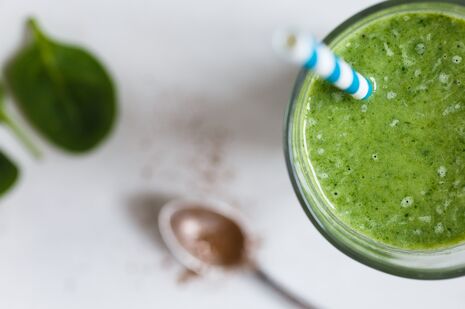Vegetarianism is one of the best ways to stop climate change
“Vegetarianism, done right, remains more environmentally friendly than any meat-based diet can ever be”

All good slogans come in threes. The French Revolution went to the barricades with ‘liberté, égalité, fraternité’. Obama won with ‘yes we can’. Rice Krispies go ‘Snap! Crackle! Pop!’. The rise in vegetarianism and veganism has added its own to the mix, distributed on flyers, printed on T-shirts, and tattooed on particularly dedicated individuals’ skin (yes, actually): ‘for your HEALTH, for the ANIMALS, for the ENVIRONMENT’. None of the three is there just to meet marketing needs nor because a slogan generator put them in, but as in so many trios, this one, too, has an unfortunate third wheel. The environment is the last, and also the least when it comes to people’s reasons for going veggie.
Just scroll through the ever-expanding vegan and vegetarian community online, and you will find a battlefield between ethical vegan warriors and healthy and hip plant-based dieters. On the Facebook group Vegan UK – serving the nation’s needs for vegan supermarket hacks and providing a platform for carnivore shaming – posts revolve around animal welfare and rights, spanning everything from ways of rescuing bees trapped between double-glazed windows to the horrors of factory farming, and Labour’s new proposed animal welfare agenda. Health and environment are restricted to the occasional contribution about issues someone may have with increased bean consumption, and the even more occasional link to a news article pointing out vegetarianism’s environmental effects. But, on the whole, veganism is about minimizing animal suffering – anyone saying they are going vegan for other reasons will be silenced before they can utter ‘non-violence’.
“The greenhouse gas emissions of the meat industry outdo those of transport”
Just as absent as quinoa bowls are from Vegan UK, are X-rated factory farm images and veganised mac’n’cheese from the plant-based, clean eating accounts. It’s the world of the kale aesthetic. It is Instagram feeds fed with açai bowls, green smoothies and overnight oats with homemade almond butter, cacaonibs and star-shaped persimmons “because today I kept it simple for breakfast”. It is Gwyneth Paltrow’s lifestyle blog and detoxing with chlorella smoothies and zoodle soups. The environment here is a background for morning smoothie and yoga snaps but never a precious gift under threat from humanity. But hey, I guess thoughts like that might mess up one’s mindfulness practice in the local forest.
Now that is strange, given that that is what the environment is – no matter what Trump and co. will have you believe. That the environment is footnoted on so many everyday vegetarian and vegan platforms – beyond it being mentioned as one of the three reasons for going plant-based – is even more puzzling given multitude of data pointing towards how meat consumption taxes the environment. The greenhouse gas emissions of the meat industry outdo those of transport – that is, all the aeroplanes, trains, cars, lorries, and boats put together. Another comparison shows that the burning of fossil fuels accounts for 57% of global greenhouse gas emissions and animal agriculture for a very much not insignificant 18%. 80% of deforested areas in Brazil were used for pasture, and more generally, the Amazon is facing deforestration because of the mass demand for soya as animal feed.
“There has to be a consolidation of the three buzzwords”
Now, vegetarianism has the full potential of being detrimental to the environment as well. Scientists at Carnegie Mellon University have claimed that eating lettuce may be up to three times worse for the environment than tucking into bacon (one wonders where the stereotype of vegetarians surviving off lettuce and carnivores stuffing their face with greasy flesh comes from…). Avocados are draining California of its water – it takes 72 gallons of water to grow a pound of avocados, the natural growing environment of which is tropical, i.e. not California. The rise in quinoa prices mean that the Peruvians and Bolivians who have eaten it for seven centuries now find junk food cheaper than their traditionally budget-friendly crop. The increased demand of soya products for humans counteracts the lessened cultivation of soya for farm animals. And the cauliflower slivers M&S wrapped in plastic and marketed as trendy veggie food – need I point where the issue is there. However, as much as Gwyneth and co. will have you believe that avocados and quinoa are to vegetarians what potatoes are to the Irish, they really need not form the base layer of the plant-based food pyramid. Rather, vegetarianism, done right, remains more environmentally friendly than any meat-based diet can ever be.
So why did only 10% of those signing up for Veganuary this year put down the environment as their reason for doing so – in contrast to the 39% doing it for health and 43% for animals? There is still something of a stigma attached to going green and being an environmental activist. For many, ‘green’ still conjures up images of Greenpeace activists climbing onto oil rigs with ‘Save the Arctic!’ banners, or ageing tree-hugging, hemp cloth-clad hippie types chaining themselves to trees to save a patch of forest from being mowed to make way for a motorway. I judge neither, yet I’m still wary of publicising that I went Green in the last general election. This makes the environment not as easily marketable as the other two buzz words: baby animals and people frolicking together on pastures as green as in The Watch Tower has somewhat more emotional oomph than a diagram of deforestation in South America, not to mention oil rigs taken over by activists.
But more significantly, actually environmentally friendly vegetarianism does not fall in comfortably with the trends spreading across the rapidly growing vegan and vegetarian communities. #veganfoodporn and #veganjunkfood bring to you images of moist seitan steaks oozing with vegan cheese, or bouncy buns stuffed with pulled jackfruit lubricated with vegan mayonnaise. In practice, vegan junk food shops produce just as much waste as your standard McD’s: plastic cups, disposable cutlery, and food wrapped up as if it were going on an Arctic expedition, even when you are eating in and your burger only needs to travel the two meters from the counter to your table. At the same time, the clean eaters of the internet would be lost without the avocados, quinoa, and other so-called superfoods, all sending thousands of miles worth of CO2 emissions into the atmosphere.
For vegetarianism and veganism to really be better for the environment, there has to be a consolidation of the three buzzwords. That may be painful for some: no never-ending supply of soya steaks for one’s foodie dreams, and no reliance on avocados as one’s staple food. But it’s better than a snazzy slogan is one which actually keeps it promises
 News / Colleges charge different rents for the same Castle Street accommodation2 March 2026
News / Colleges charge different rents for the same Castle Street accommodation2 March 2026 News / King’s hosts open iftar for Ramadan3 March 2026
News / King’s hosts open iftar for Ramadan3 March 2026 Theatre / Lunatics and leisure centres 4 March 2026
Theatre / Lunatics and leisure centres 4 March 2026 News / Angela Merkel among Cambridge honorary degree nominees27 February 2026
News / Angela Merkel among Cambridge honorary degree nominees27 February 2026 News / News in Brief: waterworks, wine woes, and workplace wins 1 March 2026
News / News in Brief: waterworks, wine woes, and workplace wins 1 March 2026









